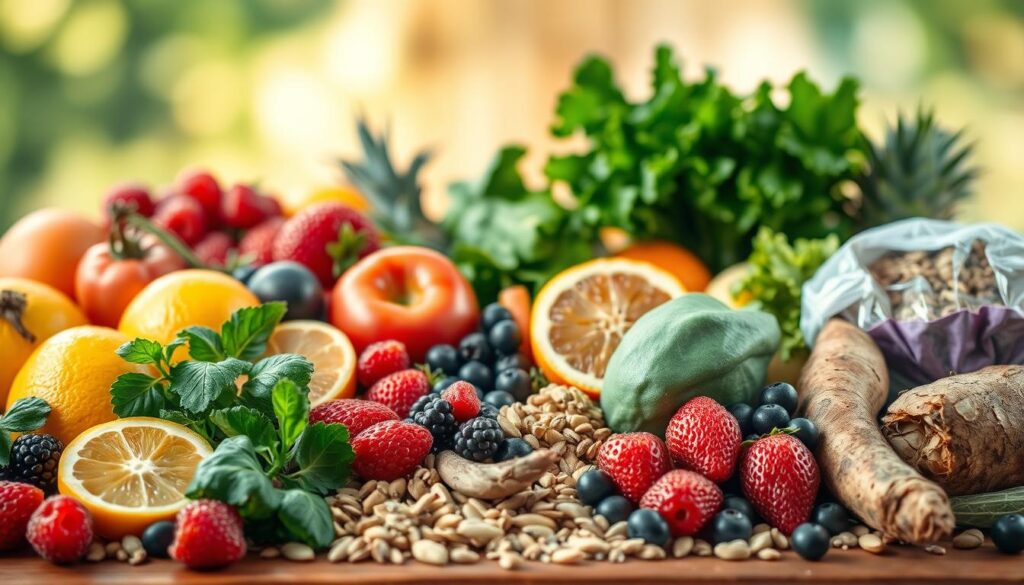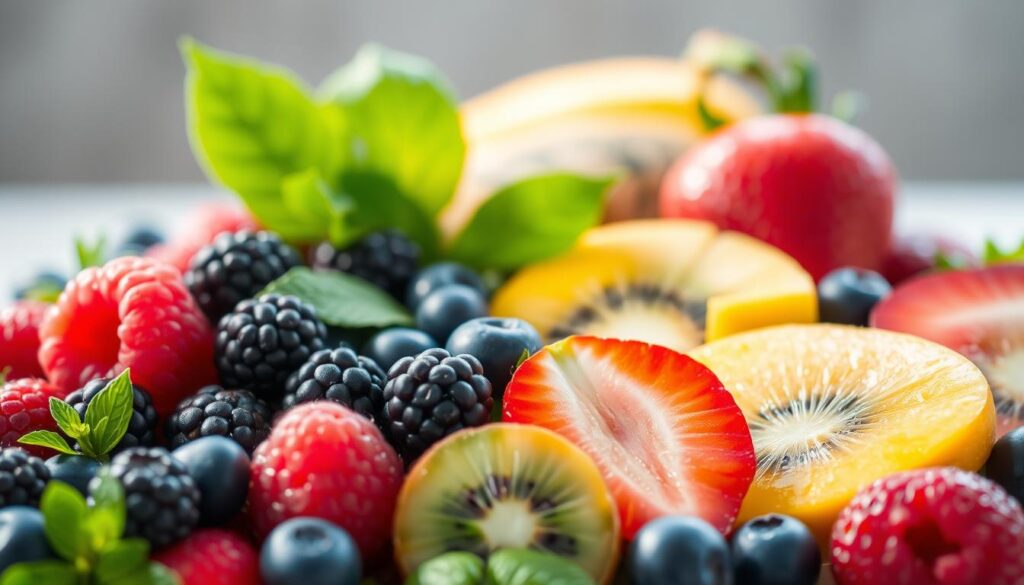Giving your child the right nutrients is crucial for their overall development. Nutrient-dense foods play a significant role in boosting their immune system, maintaining healthy skin, and supporting their growth.
Among the many food options, certain superfoods for kids stand out for their exceptional health benefits. These foods are rich in vitamins, minerals, and antioxidants that help protect children from illnesses and support their overall well-being.

Incorporating immune-boosting foods into your child’s diet can make a significant difference in their health. By choosing the right foods, you can help your child grow strong and healthy.
Key Takeaways
- Including nutrient-dense foods in your child’s diet is vital for their overall health.
- Superfoods for kids can boost their immune system and support healthy growth.
- Immune-boosting foods help protect children from illnesses.
- A well-nourished child is more likely to have healthy skin and optimal growth.
- Choosing the right foods can make a significant difference in your child’s health.
The Power of Superfoods for Children’s Health
Nutrient-dense superfoods are essential for supporting children’s growth and well-being. These foods provide the necessary building blocks for a healthy body and mind, helping children thrive and develop properly.
What Makes a Food “Super”?
A food is considered “super” when it’s rich in nutrients, antioxidants, and other beneficial compounds that provide health benefits beyond basic nutrition. Superfoods are typically high in vitamins, minerals, and fiber, making them an excellent addition to a child’s diet. Examples include berries, leafy greens, and fatty fish.
Why Children Need Nutrient-Dense Foods
Children require nutrient-dense foods to support their rapid growth and development. A diet rich in superfoods can help boost their immune system, improve their skin health, and even support their height growth. Nutrient-dense foods also help children develop healthy eating habits that can last a lifetime.
Setting the Foundation for Lifelong Health
Incorporating superfoods into a child’s diet can have long-term health benefits. A well-nourished child is more likely to grow into a healthy adult, with a reduced risk of chronic diseases such as heart disease and diabetes. By introducing a variety of superfoods early on, parents can set their children up for a lifetime of optimal health.
- Boosts immune system
- Improves skin health
- Supports height growth
Understanding the Connection Between Nutrition and Immunity
A well-functioning immune system is crucial for children’s overall health, and nutrition plays a pivotal role in supporting immune function. The food children eat can either strengthen or weaken their immune response, making it essential for parents to understand the connection between nutrition and immunity.
Key Nutrients That Support Immune Function
Certain nutrients are particularly important for immune health. Vitamin C, found in citrus fruits and berries, is known for its immune-boosting properties. Zinc, an essential mineral found in lean meats and nuts, supports the development of immune cells. Additionally, probiotics, which are beneficial bacteria found in yogurt and fermented foods, play a crucial role in gut health, which is closely linked to immune function.
How Diet Affects Children’s Immune Response
A diet rich in whole foods, fruits, vegetables, and lean proteins can significantly enhance a child’s immune response. Conversely, a diet high in processed foods and sugars can impair immune function. As
“The gut is the gateway to the immune system, and what we eat has a direct impact on our immune health.”
This highlights the importance of making informed dietary choices for children.
Signs of Nutritional Immune Deficiencies
Parents should be aware of signs that may indicate nutritional immune deficiencies, such as frequent infections, slow healing of wounds, and persistent fatigue. Ensuring adequate intake of immune-boosting foods can help mitigate these issues and support overall health.
Nutrition’s Role in Healthy Skin Development
Children’s skin health is closely linked to their nutritional habits, making diet a critical factor in maintaining healthy skin development.
A well-balanced diet rich in essential nutrients is vital for promoting healthy skin in children. Nutrient deficiencies can lead to various skin issues, underscoring the importance of a diet that supports skin health.
Essential Nutrients for Glowing Skin
Certain nutrients play a significant role in maintaining healthy skin. Vitamin C, found in citrus fruits and berries, is crucial for collagen production and skin elasticity. Omega-3 fatty acids, available in fatty fish and nuts, help reduce inflammation and promote healthy skin development.
Common Skin Issues in Children and Dietary Solutions
Children often experience skin issues such as acne, eczema, and dry skin. Dietary adjustments can help alleviate these conditions. For instance, increasing the intake of foods rich in antioxidants, such as berries and leafy greens, can help reduce inflammation and promote healthier skin.
The Gut-Skin Connection in Children
The gut-skin connection is increasingly recognized as a critical factor in overall skin health. A balanced gut microbiome, supported by a diet rich in fiber and probiotics, can significantly improve skin conditions. Foods like yogurt and fermented vegetables can help maintain a healthy gut, reflecting positively on the skin.
In conclusion, nutrition plays a pivotal role in healthy skin development in children. By focusing on a balanced diet that includes essential nutrients and supports gut health, parents can help their children achieve and maintain healthy, glowing skin.
How Nutrition Influences Height and Growth in Children
Understanding how nutrition affects height growth in children can help parents make informed decisions about their child’s diet. Adequate nutrition is crucial for supporting the growth and development of children.

Growth-Promoting Nutrients
Certain nutrients are particularly important for growth. Protein is essential for building and repairing tissues, including muscles and bones. Calcium and Vitamin D are critical for bone development and density. Other nutrients like zinc and iron play significant roles in various bodily functions that support growth.
Critical Growth Periods and Nutritional Needs
Children have different nutritional needs at various stages of their growth. For instance, during infancy and puberty, the demand for nutrients increases significantly to support rapid growth. Ensuring adequate nutrition during these periods is vital for achieving optimal height and overall health.
Genetic vs. Nutritional Factors in Height Development
While genetics play a significant role in determining a child’s potential height, nutrition can either support or hinder the realization of this potential. A well-balanced diet that includes all necessary nutrients can help children reach their maximum growth potential.
In conclusion, nutrition is a key factor in influencing height and growth in children. By understanding the importance of various nutrients and ensuring their adequate intake, parents can support their child’s healthy growth and development.
Superfoods That Improve Immunity, Skin Health, and Height in Kids
Certain superfoods are packed with nutrients that can improve immunity, skin health, and height in children. These foods offer a natural way to enhance overall health and development.
Triple-Benefit Superfoods Overview
Superfoods that benefit kids’ health are typically rich in vitamins, minerals, and antioxidants. Nuts and seeds, for example, are excellent sources of healthy fats and proteins. Berries are rich in antioxidants that help fight off infections and support skin health.
Some of the top superfoods for kids include:
- Salmon, rich in omega-3 fatty acids for brain and heart health
- Sweet potatoes, high in vitamin A for vision and immune function
- Greek yogurt, rich in protein for growth and probiotics for gut health
Research-Backed Benefits
Research supports the inclusion of these superfoods in children’s diets for various health benefits. For instance, omega-3 fatty acids found in salmon have been shown to support brain health and reduce inflammation.
| Superfood | Key Nutrient | Health Benefit |
| Salmon | Omega-3 fatty acids | Brain health, reduced inflammation |
| Sweet Potatoes | Vitamin A | Vision, immune function |
| Greek Yogurt | Protein, Probiotics | Growth, gut health |
Balancing Superfood Intake for Optimal Results
While superfoods offer numerous health benefits, it’s essential to maintain a balanced diet. Parents should aim to include a variety of foods in their child’s meals to ensure they receive a broad spectrum of nutrients.
By incorporating these superfoods into a balanced diet, parents can help support their child’s overall health and development.
Berries and Colorful Fruits: Antioxidant Powerhouses
Colorful fruits, including berries, are a powerhouse of antioxidants that can significantly benefit children’s health. These fruits are not only delicious but also packed with nutrients that support immune function, skin health, and overall growth.
Blueberries, Strawberries, and Kiwi
Blueberries, strawberries, and kiwi are among the top antioxidant-rich fruits that kids love. Blueberries are known for their high antioxidant capacity, while strawberries are rich in vitamin C, supporting immune function. Kiwi adds a boost of vitamin C and potassium, essential for heart health.

Citrus Fruits and Vitamin C Benefits
Citrus fruits like oranges, lemons, and grapefruits are rich in vitamin C, a crucial nutrient for immune function and skin health. Vitamin C helps in fighting off infections and supports the production of collagen, keeping skin healthy and vibrant.
Kid-Friendly Fruit Recipes and Serving Ideas
Making fruits fun for kids can be achieved through creative recipes. Here are some ideas:
Smoothies and Fruit Popsicles
Blend mixed berries with a bit of yogurt and honey to create a delicious smoothie. Pouring the mixture into popsicle molds can make for a cool treat on a hot day.
Fruit-Based Dessert Alternatives
Using fruits to make desserts is a healthy alternative. For instance, baking apples with cinnamon or making a fruit salad with a dollop of yogurt can satisfy sweet cravings without adding refined sugars.
| Fruit | Key Nutrient | Health Benefits |
| Blueberries | Antioxidants | Supports overall health and immunity |
| Strawberries | Vitamin C | Boosts immune function and skin health |
| Kiwi | Vitamin c, Potassium | Supports heart health and immunity |
Protein-Rich Superfoods for Growth and Repair
Protein-rich foods are essential for kids, providing the building blocks necessary for growth, repair, and overall health. These superfoods support the development of strong muscles, a healthy immune system, and can even influence height development.
Eggs, Greek Yogurt, and Lean Poultry
Animal-based protein sources are highly beneficial for children. Eggs are a versatile and nutrient-rich option, providing essential amino acids. Greek yogurt is another excellent choice, offering protein and probiotics that support gut health. Lean poultry, such as chicken and turkey, are also great sources of protein, with low fat content.
Plant-Based Protein Options: Quinoa and Lentils
For children following a plant-based diet, quinoa and lentils are excellent protein sources. Quinoa is a complete protein, meaning it contains all nine essential amino acids. Lentils are rich in protein and fiber, supporting healthy digestion and satiety.
Protein’s Role in Height Development and Immune Function
Protein plays a critical role in supporting children’s growth and immune function. Adequate protein intake ensures that children have the necessary building blocks for growth and development, including height development. Additionally, protein supports immune function, helping children fight off infections and illnesses.
Breakfast Protein Boosters
Starting the day with a protein-rich breakfast can have a significant impact on children’s health and energy levels. Some ideas include scrambled eggs with spinach, Greek yogurt with berries and granola, or whole-grain toast with peanut butter and banana slices.
Protein-Rich Snack Ideas
Healthy snacking is essential for maintaining energy levels between meals. Protein-rich snack ideas include hard-boiled eggs, cottage cheese with fruit, or trail mix with nuts and dried fruit.
| Protein Source | Protein Content per Serving | Additional Benefits |
| Eggs | 6 grams per large egg | Rich in vitamins and minerals |
| Greek Yogurt | 20 grams per 1 cup serving | Supports gut health with probiotics |
| Quinoa | 8 grams per 1 cup cooked | Complete protein, rich in fiber and minerals |
| Lentils | 18 grams per 1 cup cooked | High in fiber, supports heart health |
Leafy Greens and Vegetables for Complete Nutrition
Leafy greens and a variety of vegetables are essential for providing children with the nutrients they need for optimal growth and development. These foods are packed with vitamins, minerals, and antioxidants that support overall health, from boosting immunity to promoting healthy skin.
Spinach, Kale, and Broccoli Benefits
Spinach, kale, and broccoli are among the most nutritious leafy greens. They are rich in vitamins A, C, and K, and minerals like calcium and iron. These nutrients are crucial for healthy bone development, immune function, and even cognitive development.
- Spinach is high in iron, supporting healthy red blood cells.
- Kale is rich in vitamin A, promoting healthy vision and immune function.
- Broccoli contains a wealth of vitamin C, boosting immunity and fighting off infections.
Sweet Potatoes and Carrots for Vitamin A
Sweet potatoes and carrots are excellent sources of vitamin A, an essential nutrient for healthy vision, immune function, and skin health. Vitamin A also plays a critical role in the proper functioning of the heart, lungs, kidneys, and other organs.
| Food | Vitamin A Benefit |
| Sweet Potatoes | Supports healthy vision and immune function |
| Carrots | Promotes healthy skin and mucous membranes |
Creative Ways to Include Vegetables in Children’s Meals
Making vegetables appealing to children can be challenging, but there are several creative strategies to incorporate them into meals.
Veggie-Packed Sauces and Dips
One effective method is to blend vegetables into sauces and dips. For example, adding finely chopped spinach to pasta sauce or making a carrot-based hummus can increase veggie intake.
Kid-Approved Vegetable Preparations
Preparing vegetables in kid-friendly ways, such as roasting or making veggie sticks with a tasty dip, can encourage children to eat more vegetables.
Healthy Fats for Brain Development and Skin Health
Healthy fats play a significant role in supporting children’s overall health, particularly in brain development and maintaining healthy skin. These fats are crucial for the absorption of vitamins and the maintenance of healthy cells.
Avocados, Nuts, and Seeds
Avocados are rich in healthy fats and are a versatile food that can be easily incorporated into a child’s diet. Nuts and seeds, such as almonds and chia seeds, are also excellent sources of healthy fats and can be added to meals or snacks.
Nutritional Benefits:
- Avocados provide monounsaturated fats that support heart health.
- Nuts and seeds are rich in antioxidants and fiber.
Fatty Fish and Omega-3 Benefits
Fatty fish like salmon are rich in omega-3 fatty acids, which are essential for brain development and have anti-inflammatory properties that can benefit skin health.
Key Benefits of Omega-3s:
| Benefits | Description |
| Brain Development | Supports Cognitive function and development |
| Anti-inflammatory | Reduces inflammation, benefiting skin health |
| Heart Health | Supports cardiovascular health |
Plant-Based Omega Sources for Vegetarian Children
For children following a vegetarian diet, plant-based sources of omega-3s such as flaxseeds and walnuts can be beneficial alternatives.
Age-Appropriate Portions of Fatty Foods
It’s essential to serve age-appropriate portions to avoid overconsumption of fats. For example, a serving size of nuts for a child could be a small handful.
Allergy Considerations with Nuts and Fish
Parents should be aware of potential allergies to nuts and fish. Introducing these foods gradually and monitoring for any adverse reactions is recommended.
Calcium and Vitamin D Heroes for Strong Bones and Growth
Calcium and vitamin D are the dynamic duo that supports bone growth and density in children. Ensuring they get enough of these nutrients is crucial for their overall health and development.
Dairy and Fortified Non-Dairy Alternatives
Calcium is abundant in dairy products like milk, cheese, and yogurt. For children with dairy allergies or intolerances, fortified non-dairy alternatives such as almond milk and soy milk are excellent substitutes. Always check the labels to ensure they are fortified with calcium.
Sunshine and Supplementation Strategies
Vitamin D is essential for calcium absorption and bone health. While sunlight triggers vitamin D production in the skin, supplementation can help during periods of low sun exposure. Consult with a pediatrician to determine the best supplementation strategy for your child.
Bone-Building Recipes Kids Will Love
Calcium-Rich Smoothies and Snacks
Creating delicious and calcium-rich snacks can be fun. Here are a few ideas:
- Yogurt parfait with granola and berries
- Cheese sticks with apple slices
- Calcium-fortified smoothie bowls
Balancing Calcium with Other Minerals
A balanced diet that includes other minerals like magnesium and phosphorus is also crucial. Here’s a simple table to illustrate how different nutrients work together for bone health:
| Nutrient | Role in Bone Health | Food Sources |
| Calcium | Builds bone density | Dairy, fortified non-dairy milk, leafy greens |
| Vitamin D | Aids calcium absorption | Sunlight, fatty fish, fortified foods |
| Magnesium | Supports bone structure | Nuts, seeds, whole grains |
Conclusion: Nurturing Your Child’s Health Through Superfood Nutrition
Incorporating superfoods into your child’s diet can have a significant impact on their overall health and development. By focusing on nutrient-dense foods, you can support their immune system, promote healthy skin, and encourage optimal growth.
Superfoods for kids, such as berries, leafy greens, and protein-rich foods, provide essential vitamins and minerals that are vital for their development. Healthy eating for children is not just about providing sustenance; it’s about nurturing their health through nutrition.
By making informed choices about the foods your child eats, you can help them develop healthy habits that will last a lifetime. Encourage a balanced diet that includes a variety of whole foods to ensure they’re getting the nutrients they need to thrive.
Nurturing health through nutrition is a powerful way to support your child’s well-being. By prioritizing superfoods and healthy eating habits, you can give your child the best possible start in life.
